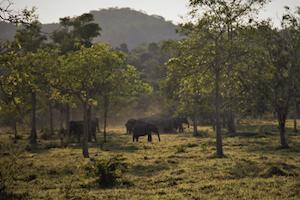Cross-cultural meanings of wildness in Thailand

Would you carry a weapon if you were a soldier tasked with corralling wild elephants back into the bush?
Thailand's Kaeng Krachan National Park is the home of about 250 wild elephants. Elephants are highly revered in Thai culture and the welfare of the few remaining herds of wild elephants is of great importance. Over a period of three weeks during December 2019 and January 2020 April Vannini and I travelled to Thailand to conduct fieldwork as part of our ethnographic project on cross-cultural meanings of wildness (For more see: https://www.facebook.com/inthenameofwild/).
In Thailand, we learned that elephants are very smart. We stayed with farmers and village leaders and we learned about some of the challenges people are facing in trying to coexist with these amazing wild animals. On New Year’s Eve we were able to join members of the military and the Wildlife Conservation Society on a routine patrol of Highway 5062.
Under the Human-Elephant Conflict Mitigation program, these highway patrols serve the purpose of keeping both drivers and elephants safe, helping the beautiful families of pachiderms cross the road and stay off it. During our 2 hour shift we counted 16 elephants, and thanks to the efficient and caring patrol everyone was kept safe. We were told the elephants see the soldiers often enough that they recognize them, and as you can see in this clip one of them even seemed to acknowledge them as it crossed the road! The day before we learned how the Bueng Nakhon Subdistrict Administration has been working with local farmers to prevent elephants from helping themselves to crops of pineapple.
As elephants are very habitual animals, the ingenious solution has been to dig large tranches cutting off their preferred path to the fields. This has kept the elephants back in the hills and the farmers happy. We also learned that the firecrackers that are used to scare elephants back into the bush don’t always work, for example. Some elephants have learned to stomp on them to prevent them from going off. They have a good sense of time too; they know when pineapple, durian, and lime are ripening, and they are known to increase their field raids during those times.
Initiatives by the Wildlife Conservation Society and various Subdistrict administrations have succeeded in reducing conflict, especially through the building of fences, digging of trenches, and the increase in military-aided road patrols. Poaching of elephants has decreased too lately. But more work remains to be done, such as devising fair compensation policies to help farmers whose crops are damaged by elephant visits. Residents of villages bordering Kaeng Krachan have also told us they wish for their concerns to be taken more seriously, and for the park administration to be more responsive to their needs.
Historically, elephants have played a crucial role in helping Thais fight wars and in developing land (especially by working with loggers). Thais view the elephant as a national symbol and everyone knows the lyrics of Pleng Chang: the elephant song. Elephants are owed respect.
And that’s why none of the soldiers dealing with elephants carry any weapons (other than firecrackers, that is!).